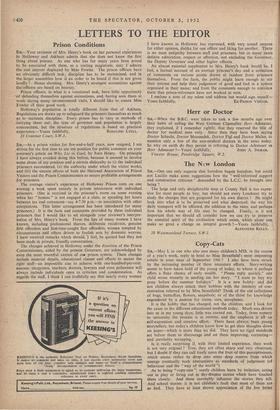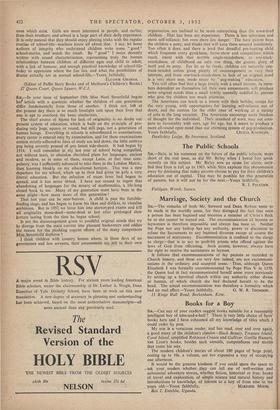Copy—Cats
SIR,—May I, as one who also sees many children's MSS. in the course of a year's work, reply in brief to Miss Streatfeild's most interesting article in your issue of September 19th 7 I also have been struck by the increasing number of these immature efforts. Story-writing seems to have taken hold of the young of today, to whom it perhaps offers a fluke chance of early wealth. " Please reply quickly," one child wrote recently in sending me her story. " I want to buy my pony before the summer holidays." It is a new hobby: and did not children always attack their hobbies with the intensity of con- centration referred to by Miss Streatfeild? Think of the old collections of bugs, butterflies, flowers, snapshots; or of the thirst for knowledge engendered by a passion for trains, cars, aeroplanes.
It is the hobby that has changed, not the children, and 1 look for the cause to the different educational methods today. Much was. driven into us in my young days; little was coaxed out. Today, from nursery to university the process is in reverse, and the emphasis is all on self-expression and creative effort. There have always been young storytellers, but today's children know how to get their thoughts down on paper—which is more than we did. They have no rigid standards set before them to discourage and set them improving, correcting— and inevitably scrapping, Is it really surprising if, with their limited experience, their work is not very original ? True, they are often sharp and very observant, but I doubt if they can call freely upon the fruit of this perceptiveness, which seems rather to drop into some deep reserve from which emerge eventually such abstractions as standards of judgement (of behaviour and the " way of the world ").
As to being " copy-cats "; surely children learn by imitation, acting out in play or living out in day-dreams stories which have touched them closely. And these inevitably influence the' stories they tell. And school stories: it is not children's fault that most of them are so bad. They have at least shown appreciation of the few better ones which exist. Girls are more interested in people, and earlier, than their brothers; and school is a large part of their daily experience. It is only natural that they should enjoy playing tricks with the regular routine of school-life--teachers know all about that. I say, let some authors of integrity who understand children write some " good" school-stories, and watch the result. By " good " I mean decently written with sound characterisation, representing truly the human relationships between children of different ages and child to adult; with a lick of humour, and enough practical knowledge of school-life today to appreciate where the fun lies, and what the possibilities of drama actually are in normal school-life.—Yours faithfully, ELEANOR GRAHAM, (Editor of Puffin Story Books and of Methuen's Children's Books.) 17 Queen Court, Queen 'Square, W.C.1.



















































 Previous page
Previous page